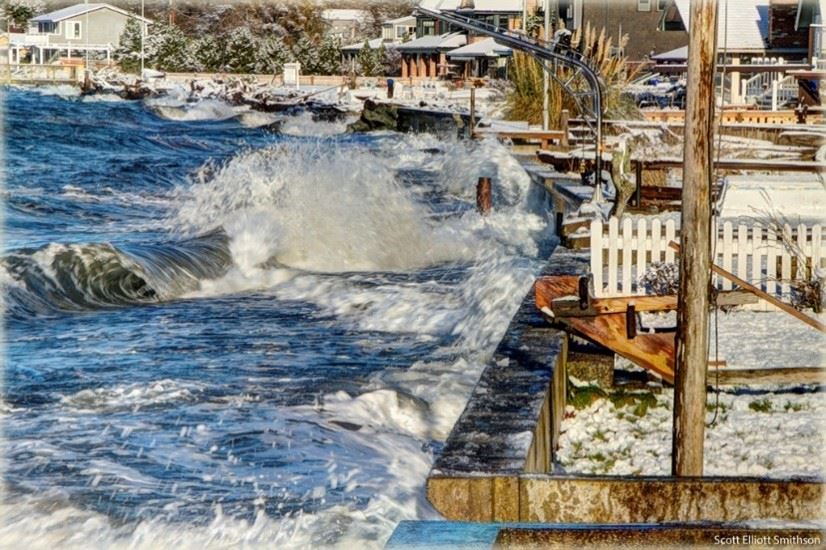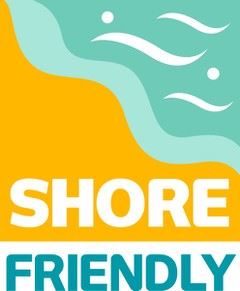
The Alternative to Bulkheads courses are endorsed by the Shore Friendly program and the content is consistent with Shore Friendly recommended practices. Participation in the training program does not indicate any form of endorsement of attendees by the Shore Friendly program, nor does participation assume subsequent work conducted by a participant adheres to Shore Friendly principles. Funded wholly or in part by EPA under grant #PC-01J22301 (NEP Habitat Strategic Initiative).
This self-paced course will provide an overview of sea level rise and coastal hazards that impact location and design of alternatives to bulkheads or armor. The course will provide science and policy context; outline the key considerations for sea level rise and shoreline stabilization projects; describe siting, design, and adaptive management of alternatives to bulkheads; and offer local and regional permitting perspectives. You’ll learn why bulkheads may not provide protection against future coastal conditions and explore alternatives including soft shore design, avoidance, and managed retreat. You’ll hear perspectives from instructors representing the research, policy, engineering, and permitting sectors about the key questions, challenges, and opportunities they are identifying as we reconsider shoreline stabilization in the context of sea level rise.
This course will available to registrants from January 8, 2024 to February 2, 2024. The course will take about 3hours to complete. Upon completion, you will receive certificate for 3AICP CM credits.
(Suggested Prerequisite: Course #5- “Techniques for Erosion Control, including Construction Materials and Maintenance”)
Please reach out to Sara Brostrom (bros461@ecy.wa.gov) if you require an accommodation for this training (audio, visual, mobility, or other). Additionally, we can offer a couple of scholarship to cover the registration fees with each training. Please reach out if you need a scholarship in order to participate in the training.
Instuctors
Charlotte Dohrn is a climate resilience planner with the Department of Ecology’s Shorelands and Environmental Assistance Program, where she works on climate change planning guidance and policy development. Her background includes climate adaptation research, restoration planning, and strategy development. Charlotte holds a Master’s degree from the University of Washington’s School of Marine and Environmental Affairs and a certificate from the Program on Climate Change.
Dr. Ian Miller is Washington Sea Grant’s coastal hazards specialist, working out of Peninsula College in Port Angeles. Ian works with coastal communities and public agencies on the Olympic Peninsula to strengthen their ability to plan for and manage coastal hazards, including tsunamis, chronic erosion, coastal flooding and other hazards associated with climate change. He holds a bachelor’s degree in Marine Ecology from Western Washington University’s Huxley College of Environmental Studies and a Ph.D. in Ocean Sciences from the University of California, Santa Cruz.
Jessica Cote is a coastal engineer with Blue Coast Engineering, which she founded in 2018. Jessica is deeply committed to the health and recovery of Puget Sound. For more than two decades she has worked on complex coastal issues nationally and globally. She received her Master’s degree in Ocean Engineering from Oregon State University.
Kathy Ketteridge, PhD, PE, is a coastal engineer with Blue Coast Engineering. Her background includes civil engineering, coastal engineering, hydrodynamic modeling, and restoration projects. She has completed many complex modeling efforts for remediation projects in the Pacific NW, British Columbia, and New York State. Kathy lives in Bellingham and has been a co-owner of Blue Coast since 2020.
Railin Santiago is a Shoreline Planner in Ecology’s Northwest Regional Office. She has done environmental permitting, biology and planning for the past 14 years. She has worked in Federal, State and Local government, and was in private consulting for 8 years. At Ecology she provides technical assistance related to implementation of local Shoreline Master Programs, and Shoreline Permitting. She has a Bachelor’s in biology from the Evergreen State College and a Master’s from the University of Washington’s School of Marine and Environmental Affairs.
Robert Perez is an associate planner with Pierce County Land Use and Environmental Review (LUER) since 2018. In this role he has met with applicants to discuss the complexities of the Pierce County Shoreline Management Program, conducted reviews for both public and private permits and represented the county in hearings when required. He received his B.A. in Urban and Regional Planning from Eastern Washington University.

These courses are endorsed by the Shore Friendly program and the content is consistent with Shore Friendly recommended practices. Participation in the training program does not indicate any form of endorsement of attendees by the Shore Friendly program, nor does participation assume subsequent work conducted by a participant adheres to Shore Friendly principles.
Funded wholly or in part by EPA under grant #PC-01J22301 (NEP Habitat Strategic Initiative).
